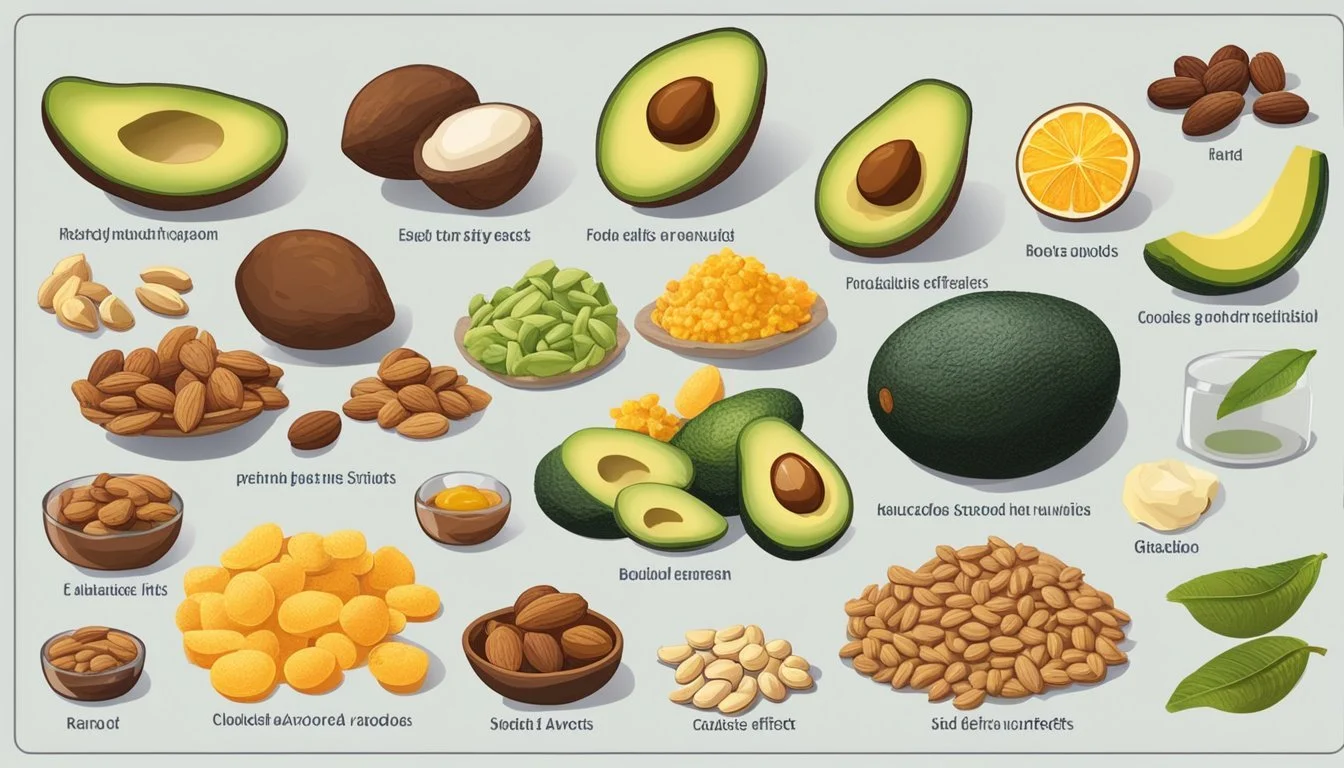10 Nutrient-Dense Foods High in Boron
Essential Sources and Health Benefits
Boron is a trace mineral that plays a crucial role in maintaining bone health and supporting overall bodily functions. Often found in a variety of plant-based foods, boron is essential for those seeking to enhance their dietary intake of this nutrient.
Incorporating foods high in boron into one's diet can contribute to better bone strength, improved cognitive function, and overall well-being. By highlighting some of the top sources of boron, this article aims to guide readers on making informed choices about their nutrition and health.
1) Avocados
Avocados are notable for their high boron content, making them an excellent addition to a diet focused on this trace mineral. A half-cup serving of raw avocado contains approximately 1.07 milligrams of boron. This makes avocados one of the richest sources of boron among common foods.
In addition to boron, avocados are packed with other essential nutrients. They offer healthy fats, fiber, vitamin E, and vitamin C. These nutrients contribute to overall wellbeing and can support various bodily functions, including bone health, which is positively influenced by boron.
Avocados can be easily incorporated into meals. They can be sliced and added to salads, blended into smoothies, or spread on toast. Their versatility and pleasant taste make them a favorite in many kitchens.
Including avocados in regular meals can help maintain adequate boron levels, supporting bone density and strength. They are especially beneficial for those seeking plant-based nutritional options, fitting well within vegetarian and vegan diets.
2) Raisins
Raisins are a powerhouse of boron. This dried fruit is among the top sources of the trace mineral. One ounce of raisins contains approximately 0.95 milligrams of boron.
Raisins also provide a good amount of fiber and B vitamins. The concentration of boron in raisins is notable, especially when considering their small size.
In a 100-gram serving of raisins, one can find about 3 milligrams of boron. This intake is significant enough to contribute substantially to daily boron requirements.
Easy to incorporate into various dishes, raisins are both a convenient and healthy option. They can be added to cereals, salads, and baked goods.
3) Almonds
Almonds are an excellent source of boron, a trace mineral important for bone health. This nut contains about 2.82 mg of boron per 100 grams, making it one of the richest sources of this nutrient in the diet.
In addition to boron, almonds are packed with healthy fats, fiber, and protein. They also provide essential vitamins and minerals like vitamin E, magnesium, and calcium. These nutrients contribute to overall health, supporting everything from heart function to bone strength.
Incorporating almonds into your diet is simple. They can be eaten raw, roasted, or used in various recipes. Almond butter and almond milk are popular alternatives to traditional dairy products, adding nutritional value while maintaining boron content.
For those looking to boost their boron intake, almonds offer a versatile and nutritious option. Whether included in a snack, salad, or main dish, almonds can help maintain healthy bones and support overall well-being.
4) Dried Apricots
Dried apricots are a notable source of boron, contributing to overall mineral intake. A 100-gram serving of dried apricots contains approximately 2.11 mg of boron. This trace mineral plays a role in maintaining bone health by aiding in the metabolism of calcium, magnesium, and other essential minerals.
In addition to boron, dried apricots offer other health benefits. They are rich in dietary fiber, which aids digestion and supports gut health. They also contain vitamins like vitamin A, crucial for vision and immune function.
Dried apricots are versatile and can be easily added to various dishes. They can be enjoyed on their own as a snack or incorporated into salads, oatmeal, and baked goods.
Despite the drying process reducing some vitamins, dried apricots remain a nutrient-dense option. Including them in a balanced diet provides valuable nutrients and supports overall health.
Their portability makes them a convenient choice for on-the-go snacking. Integrating dried apricots into daily meals can help boost boron intake, enhancing bone health and contributing to general well-being.
5) Peanut butter
Peanut butter, a popular and versatile spread, holds a moderate amount of boron.
A serving size of two tablespoons of peanut butter contains approximately 0.46 milligrams of boron, making it a convenient way to add this mineral to your diet.
In addition to boron, peanut butter provides protein, healthy fats, vitamins, and minerals, contributing to a balanced diet.
Incorporating peanut butter into meals and snacks can help support bone health due to its boron content, along with its other nutritional benefits.
Whether spread on toast, blended into smoothies, or used as a dip for fruits and vegetables, peanut butter remains a delicious and nutrient-rich option.
6) Red kidney beans
Red kidney beans are a notable source of boron, providing a significant amount of this trace mineral. A typical serving of these beans can supply about 2.4 milligrams of boron per cup, making them an excellent addition to a diet focused on bone health.
Along with boron, red kidney beans are rich in protein, fiber, and several essential minerals such as iron, calcium, and magnesium. They also contain antioxidants, which can help protect cells from damage by free radicals.
These beans are versatile and can be incorporated into a variety of dishes, such as soups, salads, and stews. Their ability to absorb flavors from other ingredients makes them a favorite in many culinary traditions.
In addition to their nutritional benefits, red kidney beans are relatively low in fat and can support heart health when included in a balanced diet. Given their high nutritional value and boron content, they are a smart choice for those looking to enhance their nutrient intake.
7) Hazelnuts
Hazelnuts are a rich source of boron, making them an excellent choice for boosting boron intake naturally. A 100-gram serving of hazelnuts contains approximately 2.77 milligrams of boron. This makes them one of the nut varieties with the highest boron content.
In addition to boron, hazelnuts offer an array of other essential nutrients. They are high in healthy fats, protein, and dietary fiber, which contribute to overall health. These nuts are also packed with vitamins and minerals, including vitamin E, magnesium, and potassium.
Incorporating hazelnuts into the diet is straightforward. They can be consumed raw, roasted, or added to various dishes such as salads, baked goods, and yogurt. Their rich, buttery flavor pairs well with both sweet and savory ingredients.
One can enjoy the health benefits of hazelnuts by consuming them in moderation. A handful a day can provide a substantial portion of the recommended daily boron intake. For those looking to support bone health and improve nutritional balance, hazelnuts are a tasty and nutritious option.
8) Broccoli
Broccoli is a well-known vegetable packed with essential nutrients, including boron. One cup of boiled broccoli provides up to 0.40 milligrams of boron.
This nutrient-dense vegetable also offers high levels of vitamin C, fiber, and vitamin K. The combination of these nutrients makes broccoli a valuable addition to a balanced diet.
Broccoli can be easily incorporated into various meals. It can be steamed, boiled, roasted, or added to soups and salads. Its versatility and nutritional profile make it a popular choice for those seeking to increase their boron intake.
In addition to its boron content, broccoli supports overall bone health and immune function. Regular consumption of broccoli can contribute to maintaining strong bones and a healthy immune system.
9) Chickpeas
Chickpeas, also known as garbanzo beans, are a nutritious and versatile legume rich in boron. They are often included in various diets around the world, particularly in Mediterranean and Middle Eastern cuisines.
They provide a substantial amount of boron, which can help in maintaining healthy bones. Incorporating chickpeas into meals can support bone density and overall skeletal strength.
Chickpeas are easy to add to many dishes, such as salads, stews, and soups. They can also be ground into flour for baking or made into hummus for a tasty dip.
They are not only an excellent source of boron but also packed with fiber, protein, and essential nutrients like iron and folate. This makes them a valuable addition to a balanced diet.
Including chickpeas regularly in your diet can be both delicious and beneficial for your health, especially for those looking to increase their boron intake.
10) Prunes
Prunes, which are dried plums, are a notable source of boron. This trace mineral is essential for bone health and has other potential benefits.
A half-cup serving of prunes provides a significant amount of boron, contributing to daily nutritional needs. They are also rich in fiber and antioxidants, promoting digestive health and reducing oxidative stress.
Prunes can be consumed in various forms, including whole, as juice, or incorporated into recipes. Regular consumption may support bone density, especially beneficial for older adults.
The versatility of prunes makes them easy to include in different dietary plans. Whether added to oatmeal, salads, or baked goods, they offer a convenient and nutritious option for increasing boron intake.
The Role of Boron in Human Health
Boron plays a crucial role in supporting various aspects of human health. It contributes to bone strength, cognitive function, and hormonal balance.
Bone Health
Boron is essential for maintaining strong bones. This trace mineral aids in the absorption of calcium, magnesium, and vitamin D, all vital for bone density. Studies show that boron can help prevent osteoporosis by enhancing bone mineralization.
Incorporating foods rich in boron, such as prune juice, avocados, and nuts, can support overall bone health. Additionally, boron supplements have shown promise in reducing bone loss in postmenopausal women. Consistent intake of boron through diet or supplements can be an effective strategy for bone health maintenance.
Cognitive Function
Boron significantly impacts cognitive function. Research indicates that adequate boron levels can enhance memory, attention, and motor skills. It influences the electrical activity in the brain, leading to improved cognitive performance.
A deficiency in boron may result in slower mental processing and decreased alertness. Including boron-rich foods such as beans, grapes, and apples in one's diet can bolster cognitive abilities. Maintaining sufficient boron intake is important for both short-term and long-term brain health.
Hormonal Balance
Boron also plays a role in regulating hormones. It is involved in the metabolism of sex hormones, such as estrogen and testosterone. Proper boron levels can help alleviate symptoms of menopause, such as hot flashes and night sweats, by stabilizing estrogen levels.
For men, boron can increase the levels of free testosterone. Foods like almonds, raisins, and peanut butter are good sources to help support hormonal balance. Ensuring an adequate intake of boron can thus contribute to a better hormonal equilibrium in both men and women.
How Boron Enhances Nutrient Absorption
Boron plays a pivotal role in improving the absorption and utilization of various nutrients essential for bone health, including calcium and magnesium.
Calcium Absorption
Boron contributes significantly to calcium absorption by interacting with the parathyroid glands, which regulate calcium levels in the body. It helps maintain optimal levels of testosterone and estrogen, hormones that enhance bone formation and calcium retention.
This trace mineral also modulates the metabolism of vitamin D, crucial for calcium absorption. Boron ensures that vitamin D remains in the body for longer periods, thereby promoting efficient calcium absorption from the intestines into the bloodstream.
Moreover, boron can help reduce calcium loss by decreasing the amount excreted in urine. This retention helps in maintaining strong and healthy bones, providing longer-term benefits in preventing conditions like osteoporosis.
Magnesium Absorption
Boron also significantly affects magnesium metabolism, another key element for bone and overall health. It improves the efficiency of magnesium utilization by enhancing its absorption in the intestines and reducing its excretion through urine.
This trace mineral supports enzyme functions necessary for the activation of vitamin D, which is essential for magnesium absorption. Boron aids in converting vitamin D into its active form, thus facilitating better magnesium uptake.
Furthermore, boron helps maintain the balance of magnesium alongside other minerals, ensuring that they work harmoniously to support biochemical processes related to bone density and overall health. This coordinated action is vital for anyone looking to boost their nutrient absorption through diet.
Potential Side Effects and Precautions
While boron is generally safe when consumed through dietary sources, it's important to be aware of potential side effects and precautions. In most cases, side effects from boron intake are rare and occur predominantly when high doses are taken through supplements.
Possible Side Effects
Vomiting
Diarrhea
Headache
Restlessness
These symptoms are less common when consuming boron through food and more likely when taking high-dose supplements.
Precautions
Pregnant and Nursing Women: They should be cautious with boron supplements, as excessive intake might pose risks.
Individuals with Kidney Problems: Consult with a healthcare provider before taking boron supplements, as kidneys are essential in excreting excess boron.
Children: Intake recommendations differ, so parents should be mindful of their children's consumption and consult a doctor if needed.
Foods and Supplements
Although high doses from food sources are uncommon, boron supplements can lead to overconsumption. These supplements should be taken as directed, and it's advisable to avoid self-prescribing high doses without medical consultation.
In summary, while boron is a beneficial trace mineral, attention to dosage and source is crucial to avoid potential side effects.








